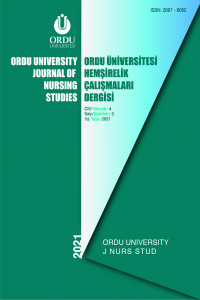Türkiye'de COVID-19 Döneminde Gebelerin Düşünce ve Duyguları: Nitel Bir Araştırma
Thoughts and Emotions of Pregnant Women in the Period of COVID-19 in Turkey: A Qualitative Study
___
- American College of Obstetricians and Gynecologists. (2020). Practice Advisory: Novel Coronavirus 2019 (COVID19). Accessed on: 21.03.2021, https://www.acog.org/clinical/clinical-guidance/ practice-advisory/ articles/2020/03/novel-coronavirus-2019
- Centers for Disease Control and Prevention. Publications and information products from the National Center for Health Statistics. Accessed on: 21.03.2021, https://www.cdc.gov/nchs/products/index.htm. 201 (cited 2020 November 10).
- Corbett GA, Milne SJ, Hehir MP, Lindow SW, O’Connell MP. (2020). Health anxiety and behavioural changes of pregnant women during the COVID-19 pandemic. European Journal of Obstetrics & Gynecology and Reproductive Biology, 249, 1-3.
- Davis-Floyd R, Gutschow K, Schwartz DA. (2020). Pregnancy, birth and the COVID-19 pandemic in the United States. Anthropology & Medicine, 39, 413-27.
- Durankuş F, Aksu E. (2020). Effects of the COVID-19 pandemic on anxiety and depressive symptoms in pregnant women: A preliminary study. Journal of Maternal-Fetal and Neonatal Medicine, 1-7.
- Fakari FR., Simbar M. (2020). Coronavirus pandemic and worries during pregnancy; A letter to editor. Archives of Academic Emergency Medicine. 8, 1-2.
- Gildner TE., Thayer ZM. (2020). Birth plan alterations among American women in response to COVID-19. Health Expectations, 1-3.
- Glover V. (2014). Maternal depression, anxiety and stress during pregnancy and child outcome; what needs to be done. Best Practice & Research Clinical Obstetrics & Gynaecology, 28(1), 25-35.
- Hacettepe University Institute of Population Studies. Turkey Population and Health Survey [online]. Hacettepe University Institute of Population Studies. 2019. (THS). Accessed on: 21.03.2021, https://www.hips.hacettepe.edu.tr/tnsa2018/rapor/TNSA2018_ana_Rapor.pdf
- Hoyer J, Wieder G, Höfler M, Krause L, Wittchen HU, Martini J. (2020). Do lifetime anxiety disorders (anxiety liability) and pregnancy-related anxiety predict complications during pregnancy and delivery? Early Human Development, 144, 1-8.
- Jiloha RC. (2020). COVID-19 and mental health. Epidemiology International, 5(1), 7-9.
- Lebel C, MacKinnon A, Bagshawe M, Tomfohr-Madsen L, Giesbrecht, G. (2020). Elevated depression and anxiety among pregnant individuals during the COVID-19 pandemic. PsyArXiv Preprints, 1-24.
- Liu X, Chen M., Wang Y, Zhang H, Sun G, Baker PN, Luo X, Qi H. (2020). Prenatal anxiety and obstetric decisions among pregnant women in Wuhan and Chongqing during the COVID‐19 outbreak: A cross‐sectional study. BJOG: An International Journal of Obstetrics & Gynecology, 127, 1229-1240.
- Mappa I, Distefano FA., Rizzo G. (2020). Effects of coronavirus-19 pandemic on maternal anxiety during pregnancy: A prospective observational study. Journal of Perinatal Medicine, 1, 1-6.
- Martini J, Petzoldt J, Einsle F, Beesdo-Baum K, Höfler M, Wittchen HU. (2015). Risk factors and course patterns of anxiety and depressive disorders during pregnancy and after delivery: a prospective-longitudinal study. Journal of Affective Disorders, 175, 385-395.
- Palladino CL, Singh V, Campbell J, Flynn H, Gold KJ. (2011). Homicide and suicide during the perinatal period: findings from the National Violent Death Reporting System. Obstetrics & Gynecology, 118, 1056-1063.
- Premkumar A, Cassimatis I, Berhie SH, Jao J, Cohn SE, Sutton SH. (2020). Home birth in the era of COVID-19: Counseling and preparation for pregnant persons living with HIV. American Journal of Perinatology, 37, 1038-1043.
- Royal College of Obstetrics and Gynecology. (2020). Coronavirus (COVID-19) Infection in pregnancy. Information for healthcare professionals. Accessed on: 21.03.2021, https://www.rcog.org.uk/globalassets /documents/guidelines/2020-03-21-covid19-pregnancy-guidance-2118.pdf
- Siston AM, Rasmussen SA, Honein MA, Fry AM, Seib K, Callaghan WM, Pandemic H1N1 Influenza in Pregnancy Working Group. (2010). Pandemic 2009 influenza A (H1N1) virus illness among pregnant women in the United States. JAMA, 303(15), 1517-1525.
- Spiegelberg, H. (1976). The phenomenological movement: A historical introduction (2nd ed., Vols. 1 and 2). The Hague: Martinus Hijhoff.
- Wong SF, Chow KM, Leung TN, Ng WF, Ng TK, Shek CC, Tan, PY. (2004). Pregnancy and perinatal outcomes of women with severe acute respiratory syndrome. American Journal of Obstetrics and Gynecology, 191(1), 292-297.
- Woody C, Ferrari A, Siskind D, Whiteford HA, Harris MG. (2017). A systematic review and meta-regression of the prevalence and incidence of perinatal depression. Journal of Affective Disorders, 219, 86-92.
- World Health Organization. (2020). Novel coronavirus ‐ China. Disease outbreak news: Update. Accessed on: 21.03.2021, https://www.who.int/csr/don/12‐january‐2020‐novel‐coronavirus‐china/en/
- World Health Organization. 2015. (WHO). WHO statement on caesarean section rates. Accessed on: 21.03.2021, https://www.who.int/reproductivehealth /publications/maternal_perinatal_health/cs-tatement/ en/ (cited 2020 October 27)
- Wu Y, Zhang C, Liu H, Duan C, Li C, Fan J. (2020). Perinatal depressive and anxiety symptoms of pregnant women along with COVID-19 outbreak in China. American Journal of Obstetrics and Gynecology, 1-27.
- Yue C, Liu C, Wang J, Zang M, Wu H, Li C, Yang X. (2020). Association between social support and anxiety among pregnant women in the third trimester during the coronavirus disease 2019 (COVID-19) epidemic in Qingdao, China: The mediating effect of risk perception. International Journal of Social Psychiatry, 1-8.
- Yayın Aralığı: Yılda 3 Sayı
- Başlangıç: 2018
- Yayıncı: Ordu Üniversitesi
Hemşirelik Öğrencilerinin Stres Kaynakları ile Algıladıkları Sosyal Destek Arasındaki İlişki
Duygu BAYRAKTAR, Arzu KARABAĞ AYDIN, Saadet ERZİNCANLI
Zehra ÇERÇER, Nursevim AYDINGÜLÜ, Evşen NAZİK, Sevban ARSLAN
Yaşlı Hastaların Yalnızlık ve Yaşamın Anlamına İlişkin Görüşleri
Banu ÇEVİK, Gülşen KILIÇ, Berrak BALANUYE, Hüseyin DORUK, Özlem GÖKÇE, Nevin DOGAN
Özlem DOĞAN YÜKSEKOL, Özlem KOÇ, Nazlı BALTACI, Habibe POLAT
Türkiye'de COVID-19 Döneminde Gebelerin Düşünce ve Duyguları: Nitel Bir Araştırma
Büşra YILMAZ, Meltem MECDİ KAYDIRAK, Nevin HOTUN ŞAHİN
Burçin IŞIK, Burcu ÇAKI, Sebahat KUŞLU, Zeynep GÜNGÖRMÜŞ
Kübra PAMUK, Nuray TURAN, Gülsün ÖZDEMİR
Yoğun Bakım Hemşirelerinin Hasta Mahremiyetini Koruma ve Sürdürme Durumlarının Değerlendirilmesi
